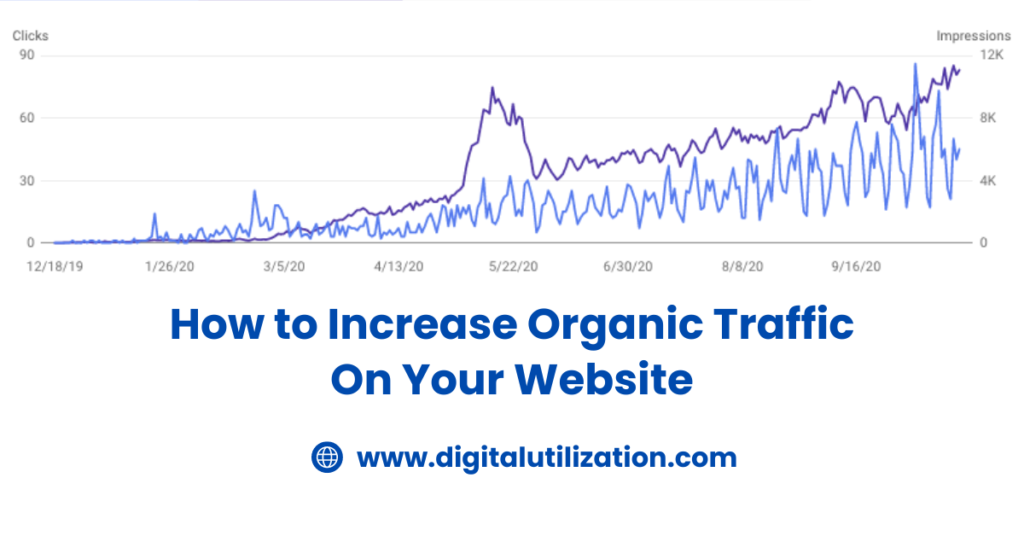The biggest perk about having a strong web presence is that people can find you more easily instead of your competitors whilst looking for services provided by you or your company. There are certain ways on how to increase organic traffic.
SEO specialist of one of the best digital marketing company in Noida states “The whole process of having a good organic search ranking is based on your understanding and implementation of SEO”. Yes, it’s about SEO again overpaid pay-per-click advertising.
Search engine optimization (SEO), though it may take some time, can yield significantly greater results than paid advertising, guest blogging, and practically any other online marketing strategy. That is what digital Marketing companies are for. They have mastered the art of SEO. However, the drawback is that there are no quick fixes for understanding how to boost organic traffic.
But before we move further and learn about how to increase organic traffic, let us discuss what is Organic Traffic and Why do you need it?
What Is Organic Traffic and Why Is it Important.
When someone visits your website organically, they do so after finding it through a search engine like Google. They are typically driven to a page on your website that responds to their search query or matches a keyword or phrase they entered.
Search engine optimization, or SEO, is the act of creating information that is more likely to be found on search.
What more could a business with a web presence want? Having your web pages rank highly in Google’s organic search listings for critical keywords can be incredibly valuable for generating traffic to your site. Even though Google updates its search engine algorithm frequently, there are ways to get the most out of it.
So without further delay let us get into it and discuss what you can do to increase organic traffic.
WAYS TO INCREASE ORGANIC TRAFFIC ON WEBSITE.
1. Prioritise Your Readers over The Search Engine
Write your buyer personas first so you can identify the audience for your content. Your SEO will inevitably increase if you produce high-quality educational content that appeals to your target customers.
In order to do this, you must focus on the core concerns of your personas and the search terms they employ. You will only have keyword-filled rubbish if you only optimise for search engines.
2. Be Regular
Perhaps the best approach to enhance organic site traffic is blogging. It enables you to delve further than your website does and generates a sizable library of beneficial, persona-focused material that is centred on your market niche. However, content that is badly produced, spammy, or inexpensive can be detrimental. Prevent it.
3. Have a Defined Keyword List
It is unrealistic to believe that you will appear first in Google for every keyword associated with your sector. Securing high organic ranks for your most targeted keywords should be your objective. Both marketing and management will have to put in work on this activity. Make a list of keywords based on how customers would search for your goods and services, then use a tool like Ahrefs, Semrush, BrightEdge, or Google’s Keyword Planner to research each term’s traffic and level of competition. The ideal keywords are those with high volume and little to no competition.
4. Choose Your Topics Wisely
While news and popular topics may temporarily increase your traffic, they are not worth the time and effort. Focus your material on subjects that your audience will always find interesting. Over time, these evergreen posts will attract traffic and links, especially if you update them frequently (more on that later).
5. Give Effort in Writing Your Headlines
One of the most crucial aspects of your material is the headline. Studies have shown that good blog headlines can increase traffic by 500%. Even the most in-depth blog post won’t get read if it doesn’t have a catchy headline. Learn the craft of writing headlines so that people would select your content on the SERP.
6. Use the Long Tail Keyword
Don’t only use the keywords that are widely used in your market. Consider using more precise keywords for your goods or services. Google and other search engines will eventually recognise your website or blog as a resource for that specific topic, which will elevate your content’s position in search results and make it easier for your target clients to find you. This is how you establish yourself as an authority on the subject.
8. Maintain a Quality Content
Always keep in mind that generating high-quality content that piques attention, encourages readers to share it and link back to it, and compels them to do so is essential before you get into some of the more technical approaches to increase SEO ranking. Since Google significantly favours content virality in its ranking algorithm, good content has the best chance of going viral. Invest in good authors, quote credible sources (websites with high domain authorities) to support your material, and make sure your content complies with Google’s requirements for high-quality content.

